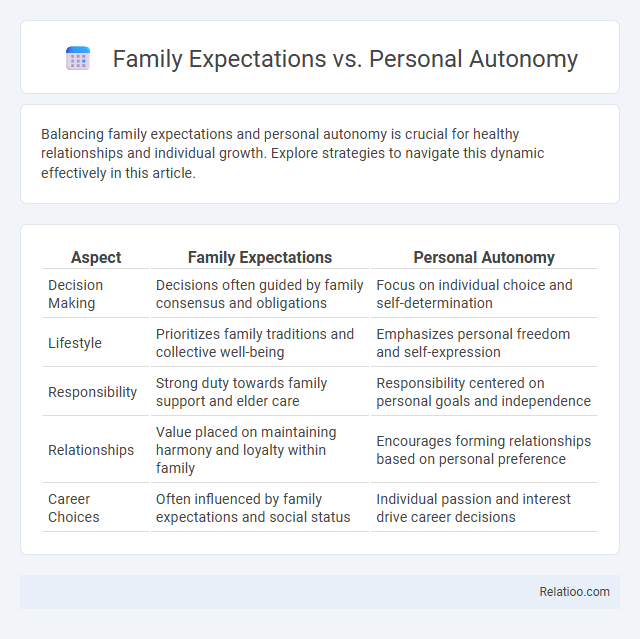Balancing family expectations and personal autonomy is crucial for healthy relationships and individual growth. Explore strategies to navigate this dynamic effectively in this article.
Table of Comparison
| Aspect | Family Expectations | Personal Autonomy |
|---|---|---|
| Decision Making | Decisions often guided by family consensus and obligations | Focus on individual choice and self-determination |
| Lifestyle | Prioritizes family traditions and collective well-being | Emphasizes personal freedom and self-expression |
| Responsibility | Strong duty towards family support and elder care | Responsibility centered on personal goals and independence |
| Relationships | Value placed on maintaining harmony and loyalty within family | Encourages forming relationships based on personal preference |
| Career Choices | Often influenced by family expectations and social status | Individual passion and interest drive career decisions |
Understanding Family Expectations
Understanding family expectations involves recognizing the values, beliefs, and traditions that shape your family's view of success and behavior, which often influence decisions regarding education, career, and relationships. Balancing these expectations with your personal autonomy requires self-awareness and open communication to maintain respect while pursuing your individual goals. Parental approval carries emotional significance, making it essential to navigate family dynamics thoughtfully to foster mutual understanding and support.
Defining Personal Autonomy
Personal autonomy is the ability to make independent decisions based on your values and desires, free from external pressures or expectations. It involves self-governance and the empowerment to pursue goals that reflect your true identity rather than conforming solely to family expectations. Balancing personal autonomy with parental approval requires clear communication and mutual respect to maintain healthy relationships.
Cultural Influences on Family Roles
Cultural influences heavily shape family roles, often prioritizing collective family expectations over personal autonomy, especially in traditional societies where parental approval is a key determinant of individual life choices. In collectivist cultures, adherence to family norms and fulfilling parental expectations can supersede personal desires, reinforcing intergenerational obligations and social harmony. This dynamic creates a complex negotiation between respecting cultural heritage and asserting individual autonomy within familial relationships.
The Roots of Parental Expectations
Parental expectations often stem from cultural traditions, family history, and a desire to ensure their children's success, shaping the roots of these demands over generations. These deeply ingrained values can create tension when Your personal autonomy conflicts with the goals set by parents. Understanding these roots helps balance honoring family expectations while asserting individual freedom and seeking parental approval through open communication.
Balancing Tradition and Individuality
Balancing tradition and individuality involves navigating family expectations while asserting personal autonomy, ensuring respect for cultural values alongside self-expression. Maintaining open communication fosters parental approval without compromising personal goals or identity. Achieving this equilibrium strengthens family bonds and supports individual growth within traditional frameworks.
Navigating Conflicts: Communication Strategies
Balancing family expectations, personal autonomy, and parental approval requires clear, respectful communication that acknowledges each party's values and concerns. You can navigate conflicts by actively listening, expressing your feelings with empathy, and setting boundaries that honor both your independence and your family's input. Establishing open dialogues fosters mutual understanding and creates a foundation for compromise that respects personal choices while maintaining family bonds.
The Impact on Mental Health
Conflicting family expectations and the desire for personal autonomy often create significant stress, leading to anxiety and depression among young adults. Parental approval serves as a crucial emotional anchor, yet when withheld, it can exacerbate feelings of low self-esteem and identity confusion. Balancing these dynamics is essential for fostering mental well-being and resilience in individuals navigating familial pressures.
Societal Norms and Changing Values
Societal norms often dictate family expectations, emphasizing obedience and collective approval which can challenge personal autonomy and self-expression. Changing values in modern societies increasingly prioritize individual freedom and personal choice, creating a dynamic tension between parental approval and independent decision-making. This evolving landscape reflects a shift towards balancing respect for tradition with the acknowledgment of diverse lifestyles and identities.
Empowering Personal Choices
Balancing family expectations with your personal autonomy requires embracing your right to make decisions aligned with your values while respecting your parents' perspectives. Empowering personal choices involves clear communication and setting boundaries that honor both your independence and the desire for parental approval. Cultivating mutual understanding fosters a supportive environment where your individuality can thrive without severing family bonds.
Building Healthy Family Boundaries
Maintaining healthy family boundaries is essential for balancing family expectations, personal autonomy, and parental approval. You can establish respect and understanding by clearly communicating your needs while honoring your family's values. Setting these boundaries fosters mutual trust and supports individual growth without compromising familial relationships.

Infographic: Family expectations vs Personal autonomy
 relatioo.com
relatioo.com